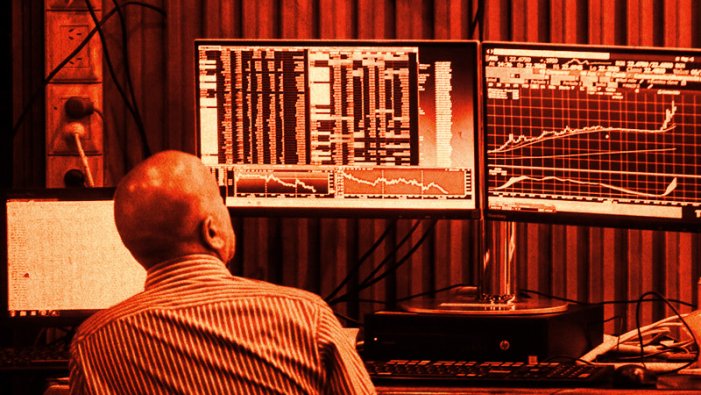
Argentine actions collapsed on the day on Tuesday to 8.2% in the New York Stock Exchange. In turn, in the local square the board was dyed red, with falls that reached up to 7.6% in the leading panel of Merval shares, deepening the previous fall. The Argentine bonds in dollars also sank more than 2% and the country risk raised again exceeding 700 points.
The government and some financial analysts minimize the creak in the “markets” and argue that it is a “correction” after the upward rally of the shares in 2024. However, the lack of definitions about an eventual agreement with the Monetary Fund International (IMF), the “political noise” in the cabinet with rumors of a Caputo resignation, the expulsion of the head of the ANSES and the daughter of Cavallo, added to the debate for the appreciation of the weight and insistence of Milei himself in Clear a possible devaluation, generate doubts and uncertainty for the economic direction.
How much the Merval index fell
The S&P Merval index fell 5.1 % in dollars in cash with liquidation. In this way, its lowest level was collapsed in three months, noting its third largest daily fall since August. The losses reached up to 7.6% in the leading panel of shares, which operated completely in red. Thus, the decline accumulated since last month reaches almost 20% in this indicator.
Among the actions that fell most on Tuesday are those linked to banks and finance: Grupo Supervielle had a collapse of 7.1%; BBVA Bank fell 6.5%, Galicia Financial Group 5.9%; and Banco Macro retreated 4.2%.
The Merval Index (Buenos Aires Securities Market) reflects the variation of the contributions of the main companies operating in the Buenos Aires Stock Exchange. As of 2019, after an agreement with the Dow Jones stock index (from New York), S&P Merval began to be called.
How much Argentines fell in New York
Worse went to Argentines in New York with decreases up to 8.2% in dollars in a single day. The poor performance was headed by the bank and energy sectors.
Although the global markets had a negative day, the analysts agree that the main factor that threw Argentine assets down was local, and in fact the negative trend they had in recent wheels were deepened.
The generalized casualties were headed by Grupo Supervielle (-8.2%), Telecom (-7,7), BBVA (-7.3%), Grupo Financiero Galicia (-7%), Edenor (-6.4%) and Macro Bank (-6.2%).
The ADRs (acronym for English depositary reept) of Argentine companies are representative of the deposit of Argentine societies that are quoted in exterior bags (mainly in the United States bags). This allows US investors to negotiate the actions of Argentine societies in the United States stock markets.
How much the bonds fell
The bonds in dollars in Wall Street also fell more than 2%, headed by the 2041 Bonar %) and 2029 bonar (-1.1%).
The country’s risk rise
For its part, the country risk, prepared by the American bank JP. Morgan, jumped 4.9% and reached 710 basic points, its highest value in 2025. In this way it exceeded 700 points, after having touched minimal celebrated by the Government at the beginning of the year. At that time he had artificially reached the 400 points on January 7, but after the payment of private debt maturity began to rise.
What did Luis Caputo say
Economy Minister Luis Caputo, who met Tuesday with the UIA industrial employers and said that the Government will not devalue but “you have to lower taxes,” he sought to clarify the exchanging of the stock market. He assured that it is a “very understandable earnings” after a long bullish period. As for the dollar bonds, in addition to correction, “the market anticipated the payment of January coupons.”
“What happened in the market is that the payment of the January coupons was anticipated, many thought that this money was going to reinvest and that that was going to generate a greater rise. In the last bimester there was precisely a rise in the bonds and in the very strong actions and is now seeing a bit of very understandable profits, ”he said in statements to Radio Rivadavia.
Doubts about the Milei Plan
Beyond possible “corrections” in overestimated values of actions, the truth is that the time to perform them is not accidental. Financial capital has more and more doubts about the agreement with the IMF, although Milei says that “the bun is only missing.”
A few weeks ago Caputo announced a kind of “dollar soy” to achieve greater liquidation of the agro -exporters that robustrate the weakened reserves of the Central Bank.
The IMF issued last week a statement in which it demanded more structural reforms, and as it is known, presses by a speedy exit of the stocks, which is linked to a devaluation of the currency. For the Government this plan would be suicidal for the election year, accelerating inflation again in a social context of income deterioration. The main electoral campaign of the ruling is precisely the “braking” (relatively) the price rise, based on a brutal adjustment and collapse of economic activity.
To this is added the fact that the president of the United States, Donald Trump, said that Argentina will not be exempt from import tariffs, contrary to what many investors speculated.
These days the looks will be put in the next Argentine debt tender that the Treasury will carry out this Wednesday and the January inflation fact that will be known this Thursday, where levels above 2%are expected.
The appreciation of the peso (or “cheap dollar”) is undeniable, no matter how much Milei insists otherwise. The consequences of this are not minor, as long as the possibility of accumulating reservations by the Central Bank is weakened. According to Invecq Consultant, the cost in the commercial exchange rate balance will be about US $ 15,000 million in 2025. To which is added the calendar of capital maturity matches and interests.
But the devaluation is not a favorable exit to working majorities. The entire employer arch proposes a resolution to the problem of debt recognizing it and religiously paying the maturities. However, this mechanism, to which the new indebtedness of Caputo is added to sustain the appreciated dollar, only perpetuates a model of imperialist subordination that restricts the economic and political sovereignty of Argentina. Therefore, the only solution favorable to popular majorities is a break with the IMF and ignorance of illegitimate external debt, based on the widest popular mobilization.
Source: www.laizquierdadiario.com

